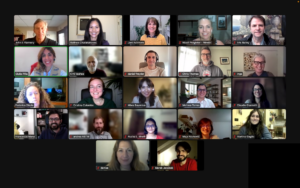 Jim McNally is presently a sales consultant with Home Depot Installation Services. His specialty is exterior building products in the residential division. Jim has held sales positions of increasing responsibility throughout the U.S. with Pfizer and Cisco Systems. Prior to his current role with Home Depot, Jim launched a brew pub in a revitalization district in Hillsboro, Oregon. He was fortunate to have sold that business prior to the pandemic.
Jim McNally is presently a sales consultant with Home Depot Installation Services. His specialty is exterior building products in the residential division. Jim has held sales positions of increasing responsibility throughout the U.S. with Pfizer and Cisco Systems. Prior to his current role with Home Depot, Jim launched a brew pub in a revitalization district in Hillsboro, Oregon. He was fortunate to have sold that business prior to the pandemic.
How do you use sales process to consistently perform at a high level?
My organization’s sales interactions occur in a customer’s home presenting the solution and financial options for closing an opportunity after a lead has been entered into our CRM tool. Asking key discovery questions, and listening are the most important steps to understanding the homeowner’s motivation for the initial consultation. Something as simple as asking a prospect “what prompted you to contact us today”? Our process begins with training retail associates to engage with customers, ask open ended questions about their home improvement project, and entering a qualified lead into the CRM tool. During the initial consultation, discipline and self-control are critically important skills in allowing the customer to respond without immediately launching into a scripted value message or an opening benefit statement based on the customer’s initial responses. Additionally, having the self-control to restrain your passion & enthusiasm for your product or service, and permit the customer to effectively describe their needs & challenges. Slow down, and follow the steps.
How do you build and reinforce sales skills development?
Short answer is “avoid taking short cuts”! I find the most effective skills development is continuously practicing both pre & post call planning. Taking the necessary time prior to the initial discussion to research the lead, and understand the customer’s business objectives and potential obstacles. After the consultation, identifying what could have been more effective and asking myself, “did I skip or overlook critical steps in my consultation”?
Please describe a recent success where you applied the techniques you have refined over the years.
My largest sales success took place last month when a homeowner shockingly did not qualify for credit on the purchase. Once the sales contract was signed, we applied for customer financing. Much to the embarrassment of the seated customer and a small group of assembled colleagues, the bank proceeded to explain over speakerphone the reasons for the denial. This was a very awkward and uncomfortable moment for any conversation. My natural sales response would have been to apologize and prevent further embarrassment by politely excusing us from their home, and request rescheduling. However; I let the silence and tension linger and much to my surprise the customer developed a financing solution of their own design. Imagine that! A customer solving my sales problem with their own solution! This was atypical sales behavior for me and quite likely for many other sales professionals too. Silence and tension are uncomfortable during the sales process, but when applied appropriately can lead to positive results. Having the discipline & self-control to “say nothing” at key times during the closing process was the learning lesson for me.
What advice would you give to other sales leaders?
Always seek improvement! As a youngster, my mother once took me to a retirement party for one of her elementary school teachers. After congratulating the teacher on her many years of teaching my mother asked the teacher, “what did she plan to do in her retirement”? The teacher responded that it was her goal to “go back to school because you can never stop learning or improving”. Keep learning, don’t take shortcuts!




